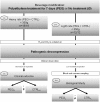Stimulating fermentation by the prolonged acceleration of gut transit protects against decompression sickness
- PMID: 29973647
- PMCID: PMC6031626
- DOI: 10.1038/s41598-018-28510-x
Stimulating fermentation by the prolonged acceleration of gut transit protects against decompression sickness
Abstract
Massive bubble formation after diving can lead to decompression sickness (DCS). Gut fermentation at the time of a dive exacerbates DCS due to endogenous hydrogen production. We sought to investigate whether medium-term stimulation of fermentation as a result of polyethylene glycol (PEG)-induced acceleration of bowel transit before diving exacerbates DCS in rats. Seven days before an experimental dry dive, 60 rats were randomly divided in two groups: an experimental group treated with PEG (n = 30) and an untreated control group (n = 30). Exhaled hydrogen was measured before the dive. Following hyperbaric exposure, we assessed for signs of DCS. After anaesthetisation, arterial blood was drawn to assay inflammatory cytokines and markers of oxidative stress. PEG led to a significant increase in exhaled H2 (35 ppm [10-73] compared with control 7 ppm [2-15]; p = 0.001). The probability of death was reduced in PEG-treated rats (PEG: 17% [95% CI 4-41] vs control: 50% [95% CI 26-74]; p = 0.034). In addition, inflammatory markers were reduced, and the antioxidant activity of glutathione peroxidase was significantly increased (529.2 U.l-1 [485.4-569.0] versus 366.4 U.l-1 [317.6-414.8]; p = 0.004). Thus, gut fermentation might have a positive effect on DCS. The antioxidant and neuroprotective properties of the fermentation by-products H2 and butyrate may explain these results.
Conflict of interest statement
The authors declare no competing interests.
Figures







References
-
- Nishi, R. Y., Brubakk, A. O. & Eftedal, O. S. Bubble detection in The Bennett and Elliot’s Physiology and Medicine of Diving edited by Brubbak, A. O. & Neuman, T. S. pp. 501–529 (WB Saunders, London, 2003).
-
- Bert, P. La pression barométrique. [Barometric pressure] (Masson, 1878).
-
- Blatteau JE, Souraud JB, Gempp E, Boussuges A. Gas nuclei, their origin, and their role in bubble formation. Aviat Space Environ Med. 2006;77(10):1068–1076. - PubMed
-
- Francis, T. J. & Mitchell, S. J. Pathophysiology of decompression sickness in Bennett and Elliott’s Physiology and Medicine of Diving, edited by Brubakk, A. O. & Neuman, T. S., pp. 530–556 (WB Saunders, London, 2003).
Publication types
MeSH terms
Substances
LinkOut - more resources
Full Text Sources
Other Literature Sources

